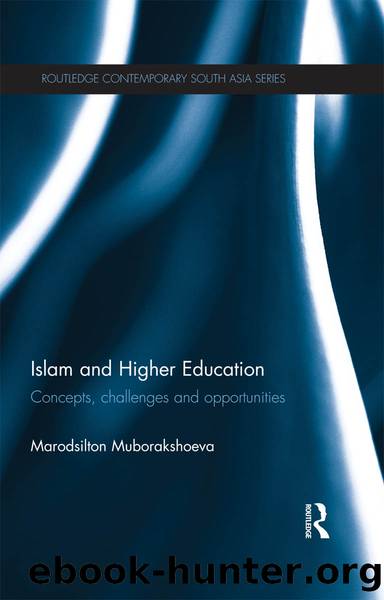Islam and Higher Education by Muborakshoeva Marodsilton;

Author:Muborakshoeva, Marodsilton;
Language: eng
Format: epub
Publisher: Taylor & Francis Group
5
Case studies of universities visited
Introduction
The development of higher education in contemporary Muslim countries generally and in Pakistan specifically has entailed many changes as well as challenges. While the previous chapters presented a broad categorisation of institutions along global and local, religious and creative models, this chapter intends to present case studies of seven institutions. As noted previously, the seven institutions selected were the University of the Punjab, National College of Arts, Karachi University, Aga Khan University, Hamdard University, Lahore University of Management Sciences, and University of Management and Technology. Through the exploration of their concepts, aims and role in society and distinctive features, it will be shown that, despite numerous issues and problems, most of these institutions have managed to preserve their identities and have expanded the concept of âa universityâ by connecting it to the best of past and present cultures and civilisations. The case studies will be presented according to the chronology of the universitiesâ creation.
The University of the Punjab (UP)
The University of the Punjab, the fourth university after the universities of Calcutta, Bombay and Madras in colonial India, was the only university that Pakistan inherited following partition in 1947. While the latter three were established with the direct involvement of the British colonial powers, the founding of the UP was the result of cooperation between Indian and British intellectuals and administrators after it was felt that the pure English education at the established universities lacked ingredients important for a national education system (Mathur, 1968). Although the university was founded in 1882, its first college, Oriental College, was established in 1870. The concern of this college was the preservation and promotion of Oriental learning and the diffusion of European knowledge through the medium of the vernacular under the leadership of Dr Leitner and the literary society of âAnjumani Punjabâ (Society of the Punjab) (see Mathur, 1968 and Singh, 1993).
From its inception, the university was not necessarily âa teachingâ university, as envisaged by British officials, who wanted the English language, as opposed to the vernaculars, to be the medium of instruction so as to gear education to the needs of the civil service, businesses and industries. The early enthusiasm for learning and research and scholarship at Oriental College bears witness to this. As was highlighted in the previous chapter, the research conducted at this college was valuable and very prominent, especially in vernacular languages. The most prominent scholars and teachers of the college were Allama Muhammad Iqbal, Moulavi Muhammad Shafee, Dr A.S. Ahsan, Dr Sayyed Abdoullah, Dr W. Qureishi, Dr Akram Shah, Dr Aftab Asghar, Dr Khawaja Muhammad Zakariya and many others.
Similar achievements and prominent scholars were abundant in other faculties and departments across the university. It has prepared civil servants and professionals for a wide variety of fields, such as education, medicine, social services, law, engineering, sciences, technology and others. Some prominent public and political figures, as well as scholars and scientists within and outside Pakistan, are the product of this university. Two of its graduates, Professor Abdus Salam in physics and H.
Download
This site does not store any files on its server. We only index and link to content provided by other sites. Please contact the content providers to delete copyright contents if any and email us, we'll remove relevant links or contents immediately.
The European History Highway: A Guide to Internet Resources by Dennis A. Trinkle Scott A. Merriman(494)
The Seven Wonders of the Ancient World by Michael Denis Higgins(477)
European Security in a Global Context by Thierry Tardy(470)
European Security without the Soviet Union by Stuart Croft Phil Williams(469)
The Routledge companion to Christian ethics by D. Stephen Long Rebekah L. Miles(458)
Hudud Al-'Alam 'The Regions of the World' - a Persian Geography 372 A.H. (982 AD) by V. V. Minorsky & C. E. Bosworth(399)
Gorbachev And His Generals by William C. Green(391)
Get Real with Storytime by Julie Dietzel-Glair & Marianne Crandall Follis(390)
Tibetan Studies in Comparative Perspective by Chih-yu Shih Yu-Wen Chen(385)
Governance, Growth and Global Leadership by Espen Moe(381)
Hyperculture by Byung-Chul Han(378)
CliffsNotes on Fitzgerald's The Great Gatsby by Kate Maurer(360)
The Oxford History of the World by Fernández-Armesto Felipe;(354)
How Languages Are Learned 5th Edition by Patsy M Lightbown;Nina Spada; & Nina Spada(353)
The Egyptian Economy, 1952-2000 by Khalid Ikram(352)
Oral Poetry and Narratives from Central Arabia: The Poetry of Ad-Dindan : A Bedouin Bard in Southern Najd (Studies in Arabic Literature, Vol 17) (English and Arabic Edition) by P. M. Kupershoek P. Marcel Kurpershoek(343)
The Oxford Handbook of the Incas by Sonia Alconini(333)
Europe Contested by Harold James(319)
The Hutchinson Dictionary of Ancient and Medieval Warfare by Peter Connolly John Gillingham John Lazenby(305)
